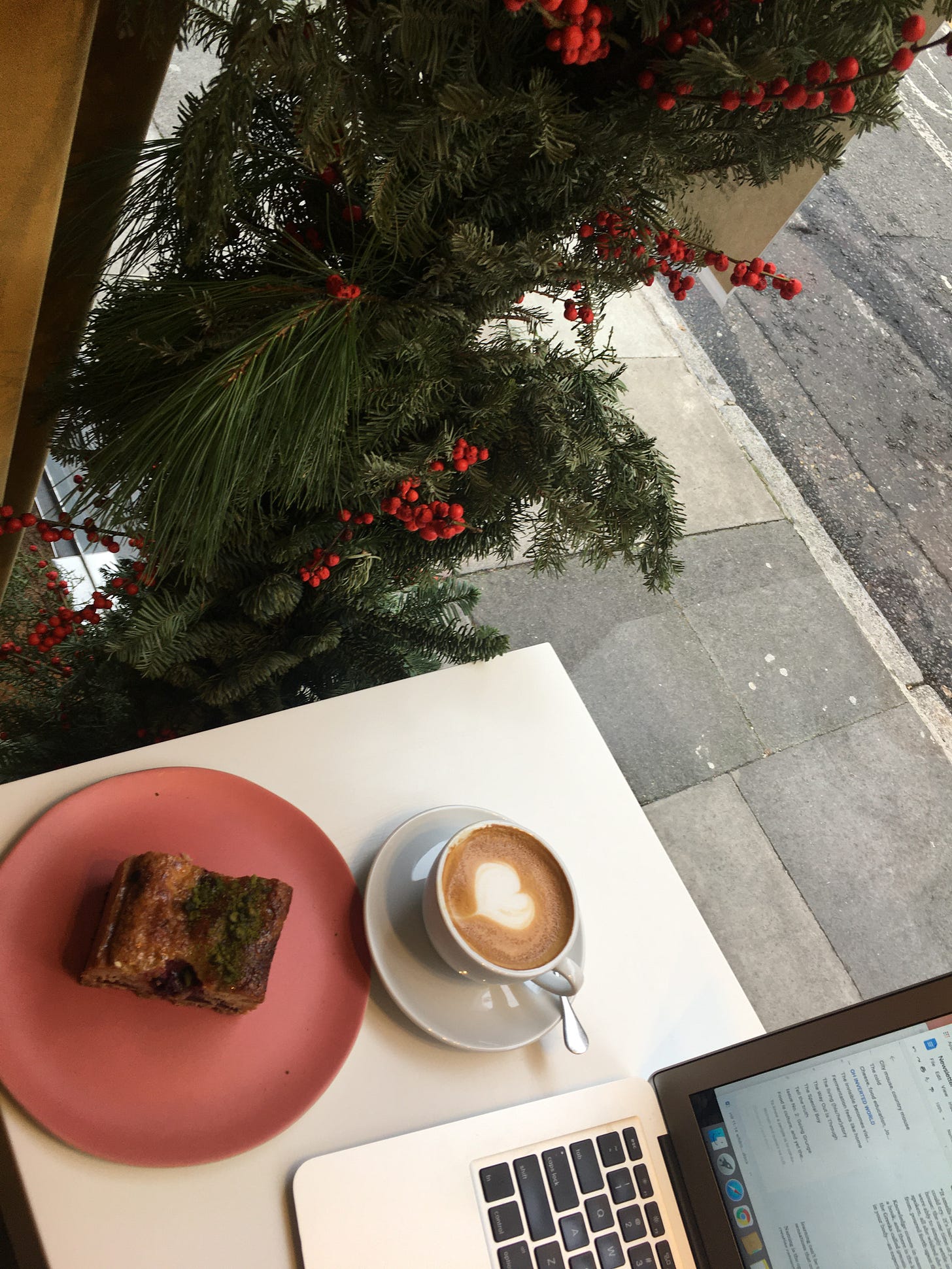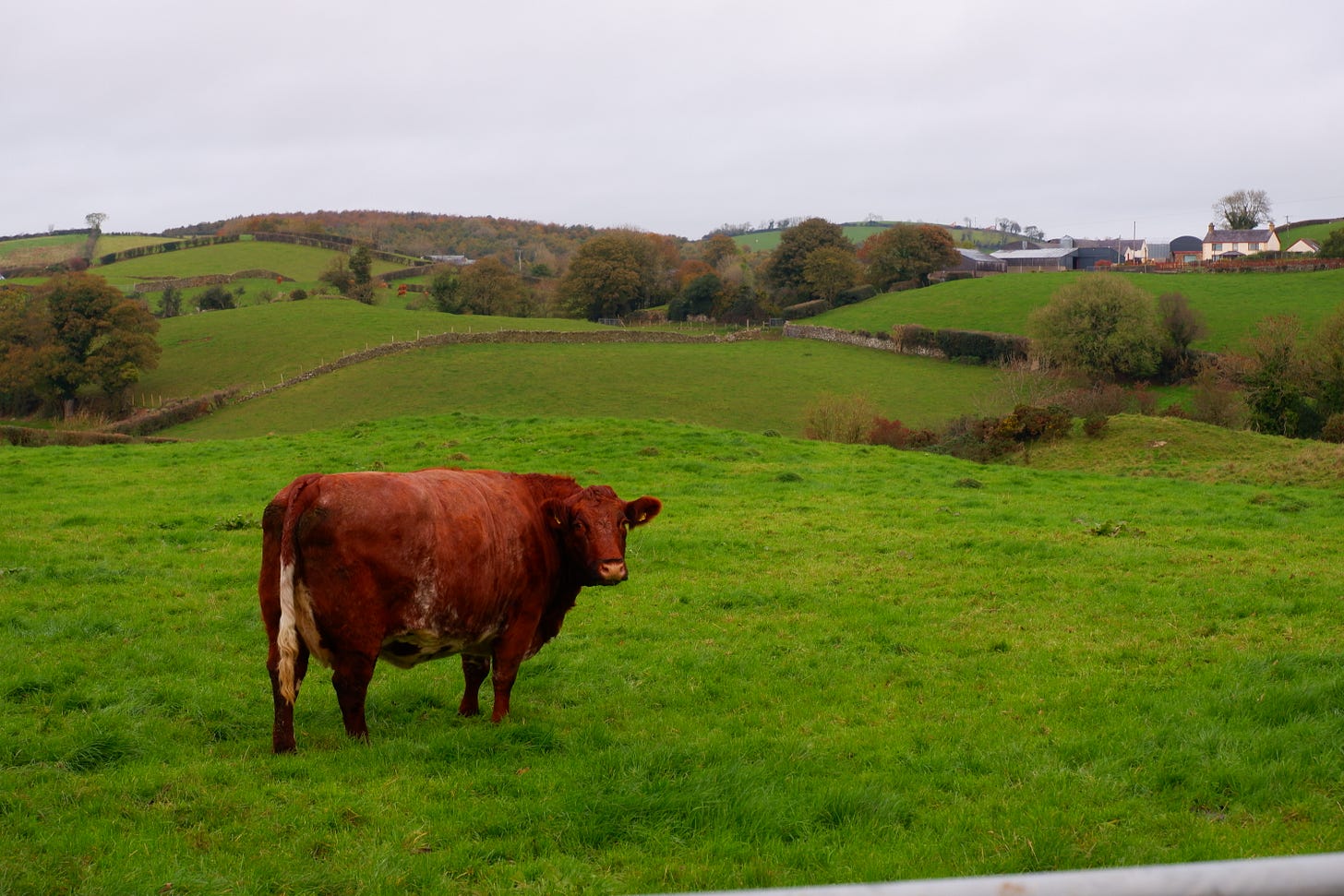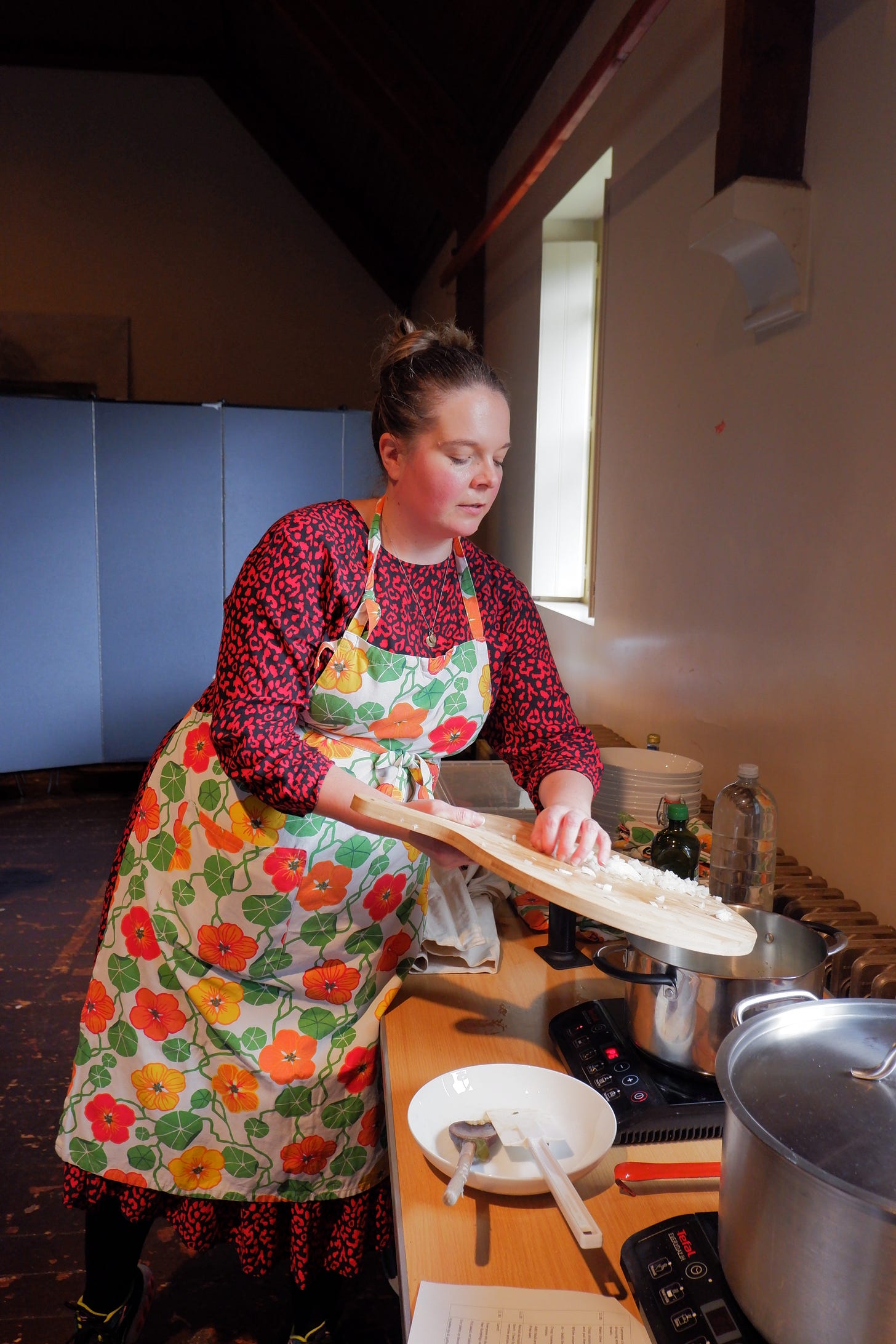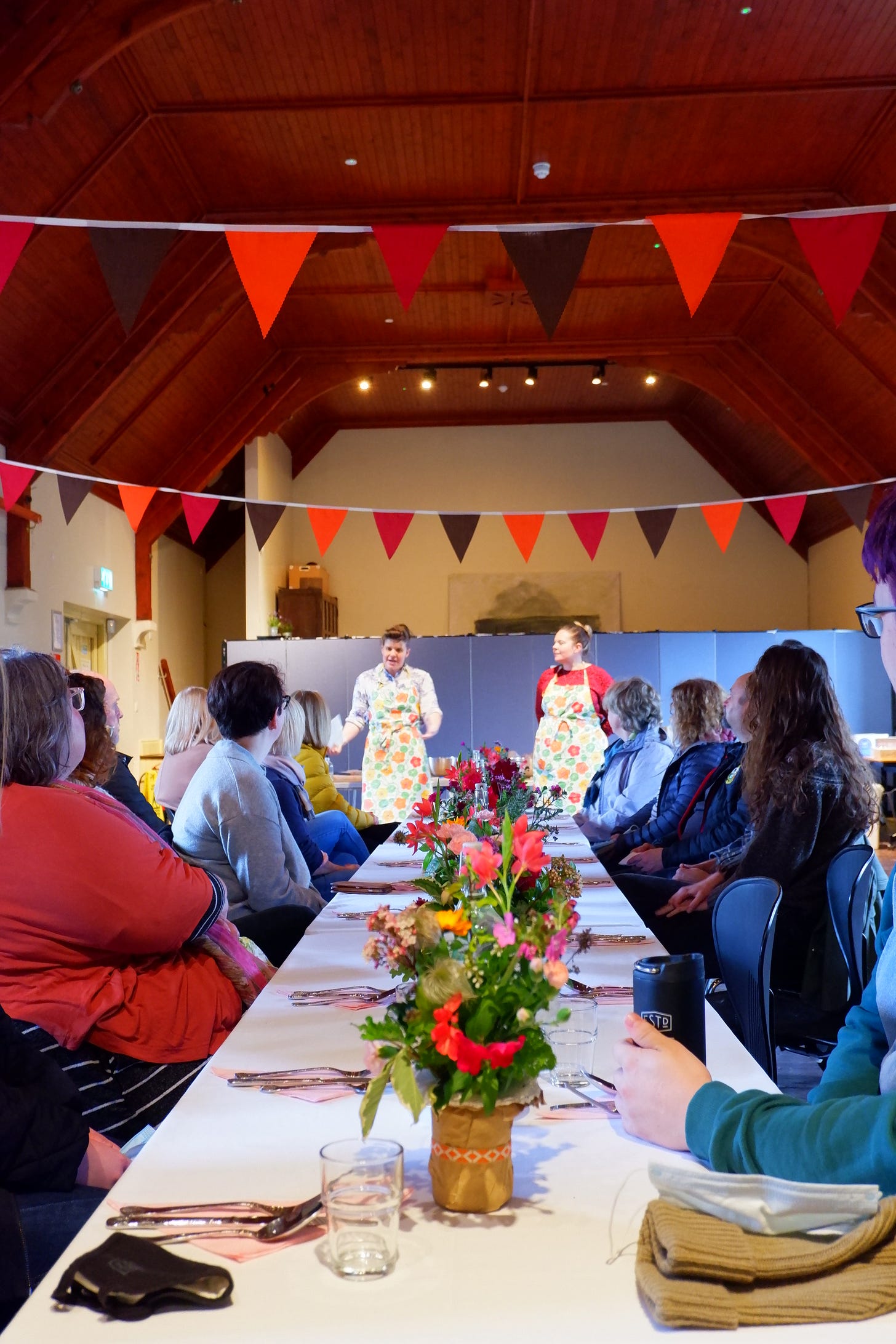Knowledge comes in many forms. There is the kind you can learn in a lecture or read in a book. There is the kind you can know, from the innermost core of your being; what the Greeks called gnosis. But then there is another kind altogether, the kind that is felt in your body: an experiential knowing, accessed through the senses. It’s the kind of learning that can’t be taught, but must simply be entered into.
Sensory knowledge activates primal parts of you, unearthing pictures past. It smells so much like Christmas at my grandmother’s house in this corner of Ottolenghi Spitalfields where I’m writing that I could cry, barreling me backwards to those sacred mornings when our family traumas got the volume turned down. I want to stay here all day because of that smell, because here, I’m 10 years old again, sitting in her kitchen—tasting butter and tart fruit, breathing that combination I can’t quite pin down; cinnamon and cranberry, savory and clove, burnt sugar and citrus-musky spice.
In the hallowed halls of this queer Israeli chef, I gather pieces of my backstory, and all without speaking a word.
Naming is the opposite of feeling, but it’s how we make sense of the world. We affix labels and create categories in a vain attempt to order the disorder and grab something static in the swirling chaos that surrounds; to clarify the confusion that comes with being a being.
But the folly of human existence is that in trying to pin down the thing, we destroy it; to hold something that’s wholly alive is, like Steinbeck’s big lug, to extinguish its spark. Karl Ove Knausgaard says in the final book of his six-volume memoir that we invented language to make the world feel less lonely, yet this naming crushed its most beautiful quality, ineffability: the fact that our experience cannot be encapsulated in a series of guttural grunts.
For the tyranny of Latin characters turns the infinite, multidimensional, and contextual into a flat and lifeless binary; the boundaries of vowels and consonants create an artificial separation between the namer and the named. In identification and classification, we invert the natural order. The very notion of Me is at odds with You, and humans have been trying to work their way back to We ever since.
Queer people inhabit an inverted world in global Northern society; we of the ever-expanding acronym, dwelling in society’s negative space. “Invert” was the term used to describe the LGBTQIA+ in the late 19th and early 20th centuries, invoked by sexologists: a branch of psychology whose adherents attributed all queer behavior to a twisted pseudo-theory of trans-ness. They claimed anyone born with female biology who was attracted to women was really a man inside, and vice versa; bisexual and pansexual people had the soul, if not the physical apparatus, of the intersex. Even those who sought to normalize such people and behaviors still operated under cultural assumptions of aberrance, perpetuating toxic myths.
Some of the sexologists were queer themselves, attempting to interpret their own internal struggle—fighting for the abolishment of anti-queer legislation, but on the basis of sexual orientation and gender identity as both binary and inseparable from anatomy. “Born this way” isn’t the anthem of LGBTQIA+ liberation we’ve been led to believe, it’s eugenics, used to reinforce imperialist hierarchies.
Forced sterilizations, castrations, and conversion therapies were called “treatments” well into the 20th century, based on the naming of natural behaviors as sexual perversions—and that’s aside from additional, unspeakable horrors committed against queer people of intersectional backgrounds. Even in England, sodomy was punishable by death until the 1800s and not decriminalized until 1967; Ireland only legalized same-sex marriage last year, despite broader social acceptance predating it; and there are still 69 nations where being queer is a crime that can bear capital penalties.
But the most insidious weapon of the patriarchy is when they turn you against yourself. To grow up in the inverted world is to internalize hateful narratives from colleagues, coaches, culture, family, and so-called friends. Our collective unlearning involved denying our own bodies, the drives and desires that vibrated from our heads down to our toes; rejecting the embodied awareness that we gnew in the sensory sense. Perhaps the way back to ourselves begins by crawling into our own skin—reclaiming the narrative not just by telling a different story, but by grounding it in physical reality.
The younger generations inherently know that there isn’t much in a name. Gen Z is the most diverse ever recorded in nearly every measure; they identify as queer and trans in record proportions, and one in four LGBTQIA+ youth is nonbinary. Inverting the ancient order, the younger often educate the elders these days; a majority of Americans now believe gender names and norms are outdated and will continue to change. Meanwhile, all along generational lines, those who inhabit the both-between are finding avenues for self-expression.
Like all art, cuisine can challenge assumptions and cultural messages, but this medium is unique in that it is inherently embodied. It forces presence for even those of us who drift into the dissociative; a delicious taste or pungent aroma jolts you into the awareness that you are an animated being, and you are here on this earth. Today, there are culinary spaces where queers are the experts, not the exceptions; the educators, not the re-educated, inverting the model and asking the masses to take our understanding into their bodies. The mere presence of such people makes a statement, and it makes me proud.
Erin Bunting and Jo Facer are the wife-and-wife team behind The Edible Flower: a food education and events business based from the idyllic former farmhouse outside Belfast that they share with their two cherubic twins; a giant, flat-nosed orange cat; and rolling acres of vivid green. Here, Facer coaxes vegetal life from the verdant land for Bunting to nurture into decadent yet nourishing meals; she also brews fresh, hyper-local beers that pair with the feasts.
Their home is as warm as their hearts, and they regularly open both to guests who often sell out their events within minutes. I’m blessed to lend a hand behind the scenes at some of these, and am inspired by both their personal and professional journeys—an example of the kind of expansion the farm-to-table and specialty food and beverage spaces need.
The first event I participated in was “an ode to the humble turnip.” It was held in a drafty upper room of the Ulster Folk Museum, where it’s perpetually the year 1900, a miniature city frozen in time. We displayed massive, gnarled turnips still dusted with dry earth next to floral arrangements; welcomed guests with tea made from garden-fresh herbs; and set up chopping stations where they could help prepare the sample meal. The actual main course—a premade vat of turnip, barley, carrot, and kale stew topped with dumplings—was set over a gentle flame, and the savory warmth of rosemary slowly permeated the cold air.
As Bunting and Facer taught them about the traditional importance and usage of the turnip to the Irish, guests listened with rapt attention and asked well-informed questions. They eagerly participated in creating the meal, absorbing tips and techniques: cutting and slicing, layering and seasoning; observing Bunting and Facer’s delicate ballet as they expertly pirouetted between prep station and stove. But the moment everyone was waiting for was when the talking stopped, and we turned ourselves over to the experiential feast.
For the experiential is what lodges itself in peoples’ memories. It’s the scent they’ll pick up on a market breeze and remember giant roots yielding under their knife; the warmth of the soup that slowly spread from their belly to their limbic system after coming in from the cold. The sensory connects you to past and present in the here and now, linking you to the Earth and all life through your body, reminding you that you have never been separate.
So let us release our attachment to the language, turning the interpretations of our cultures upside down. Let us welcome the inexplicable, cherish the ephemeral, and trust in our deeply felt sense. Let us stop talking for a moment, and instead, to taste, touch, listen, and smell—resting comfortably in the presence of all that cannot be named.










Wonderful to read and...reread. Thank you!